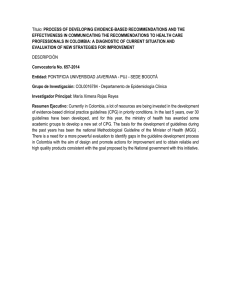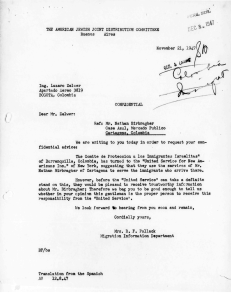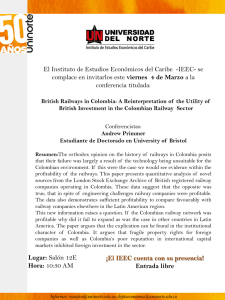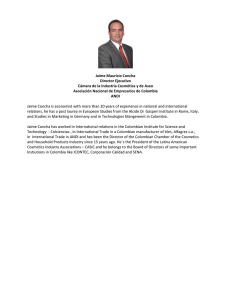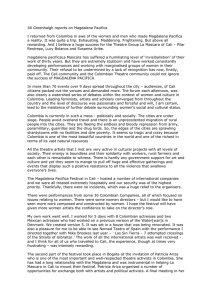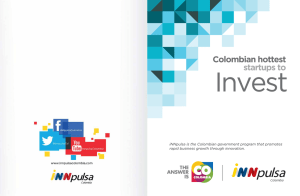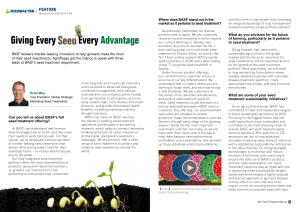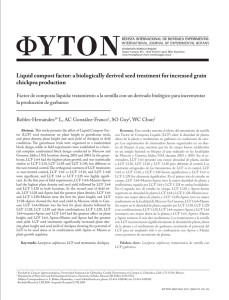Provokame
Anuncio
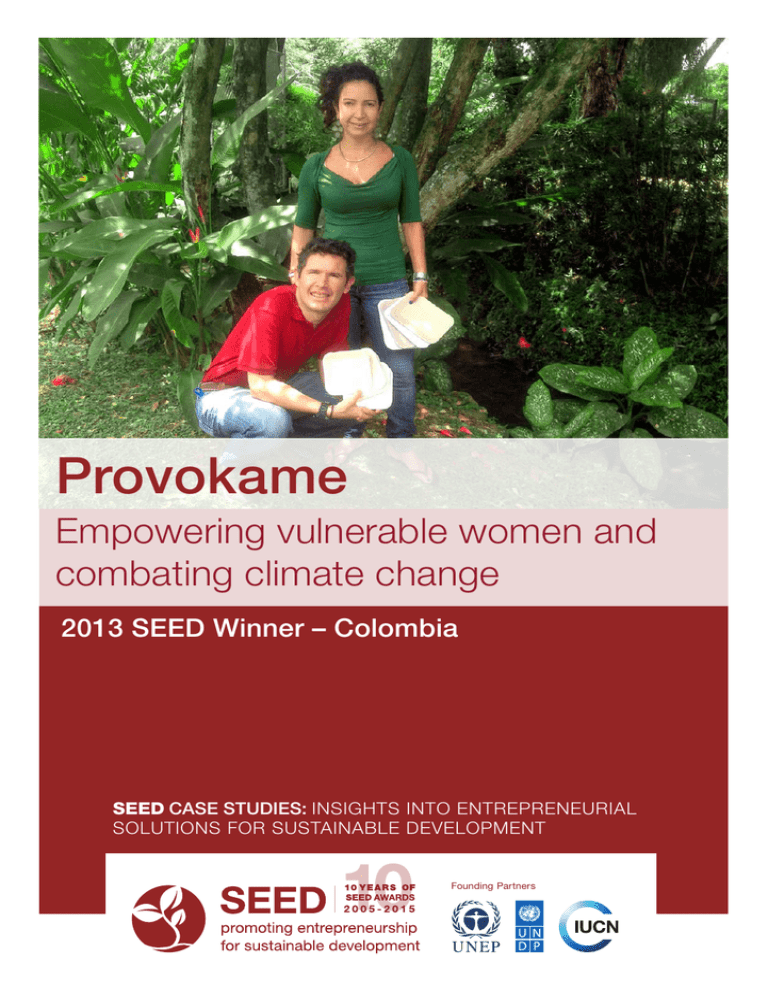
CONTACT US Provokame Empowering vulnerable women and combating climate change 2013 SEED Winner – Colombia SEED CASE STUDIES: INSIGHTS INTO ENTREPRENEURIAL SOLUTIONS FOR SUSTAINABLE DEVELOPMENT Founding Partners 2 AT A GLANCE SEED CASE STUDY: PROVOKAME IMPRINT Publisher: SEED c/o adelphi research gGmbH Caspar-Theyß-Str. 14a, D-14193 Berlin Germany www.seed.uno | info@seed.uno Lead Authors: Amélie Heuer (SEED), Magdalena Kloibhofer (Adelphi Research), Helen Marquard (SEED). For further information, contact: Amelie Heuer (amelie.heuer@seed.uno) CONTENT 1. Partnering for local solutions 4 2. Building an inclusive eco-enterprise 8 3. Reaching impact 10 4. Charting green and inclusive growth 12 Contributing Authors: Julia Rohe (SEED/ Adelphi Research) Provokame produces biodegradable plates out of natural fibre and recycles paper; this reduces pollution from polymer plates and decreases GHG emissions. Layout/Design: alma grafica UG www.almagrafica.de Picture credits: Provokame / Lifepack KEY FACTS PRODUCTS & SERVICES 100 % biodegradable paper plates embedded with plant seeds Awarenessraising workshop for schools on sustainable production and consumption Training of women in plate making Supported by: the European Union, the Government of Flanders, Federal Ministry for Environment, Nature Protection, Building and Nuclear Safety, Germany and Ministry of Economic Affairs, Netherlands and UN Women TRIPLE BOTTOM LINE The findings, interpretations and conclusions expressed in this publication are those of the authors based on interviews and site visits to the enterprise and do not necessarily reflect the views of SEED or Adelphi Research. By working at the grassroots, Provokame has provided over 100 vulnerable women with a job and income while raising awareness around sustainable production and consumption in the community. • Location: Cali, Columbia • Founded: 2010 • Active: Colombia & USA • Workers: 20 • Annual turnover: USD 81,000 PROVOKAME PARTNERSHIP Social impacts Copyright © 2015 adelphi research gGmbH. All rights reserved. May 2015 SEED Case Studies Series Demonstrating Sustainable Development on the Ground Through Locally-driven Eco-entrepreneurship Social and environmental entrepreneurship, also known as green and inclusive entrepreneurship or eco-entrepreneurship, could play a critical role in achieving a global Green Economy. By embracing the added values of social improvement and wise resource management eco-enterprises that have won a SEED Award are living proof that entrepreneurial partnerships between various stakeholders can create innovative and novel solutions for delivering sustainable development at the grassroots and be economically sustainable. Over the last ten years, SEED has awarded nearly 180 SEED Awards to eco-enterprises in 37 countries. While the value of eco-entrepreneurship in delivering sustainable development is increasingly recognised and harnessed in the development sphere, there is still very little data available on the triple bottom line impact of these entreprises and their contribution to sustainable development. The SEED Case Studies are designed to help fill that gap by generating insights for policy and decisionmakers on the role of green and inclusive enterprises in achieving sustainable development, and on enabling factors that can help them overcome barriers and reach scale and replicate. • Provided skills training to over 100 women. • Created 20 direct jobs. »» Provides an additional income of USD 3,000 per year on average to single-mother households. BUSINESS Arch Grants Yield Labs Environmental impacts • Replaced 96,000 plastic and polystyrene plates in 2014. • Reduced over 5 tonnes of CO2 equivalent GHG emissions in 2014. »» Reduces plastic waste by 1000 kg per annum. LifePack (PROVOKAME) Environmental impacts • Created a new market and value chain from previously unused agro--industrial waste. • Helped 20 female prison inmates to become contributing members of society. »» Reduces governmental expenditures in waste processing and in prison management Universidad Ices RESEARCH Pontificia Universidad Javeriana Universidad los Andes 4 SEED CASE STUDY: PROVOKAME 1. Partnering for local solutions 1.1 Local challenges Santiago de Cali: “Most violent city in Colombia” Any lover of Salsa music will have heard of Santiago de Cali, usually called ’Cali’, for its reputation as the cultural capital of Salsa music. This bustling and vibrant city is the capital of the Valle del Cauca department and with a population of over 2 million is Colombia’s third-largest city after Bogotá and Medellín. Founded in 1536, Cali has become the industrial, agricultural, and commercial centre of the southwest and is one of the fastest growing economies in the country. At the same time, the mention of Colombia regrettably also brings to mind stories of the drugs trade and intermittent armed conflicts between the Colombian government, paramilitary groups, crime syndicates and guerrillasI. It has been reported that as a result, between 1985 and 2012 more than five million civilians were forced from their homes, generating the world’s second largest population of internally displaced persons (IDPs)II. The sophisticated drugs trade has played a primary role in fuelling violent conflicts and Cali did not remain untouched. From the mid-1970s, Cali was home to one of the biggest drugs cartel in the country - the Cali Cartel. While the cartels were destroyed in the mid1990s, it is believed that over 300 drug-smuggling organisations are still active in the country todayIII. The region is nowadays a lot safer than 10 years ago, but a 2013 report states that Cali remains the most violent of Colombia's main citiesIV. Women and Poverty in Colombia Despite being considered a country with a high level of development, ranking 98 in the UNDP’s Human Development Index V, Colombia still faces a face issues of gender discrimination as well as being stigmatised after their sentence, making them an even more vulnerable group of society. series of social issues, many of which relate to the role of women in society. Colombia has traditionally had a patriarchal society VI and while the status of women has improved, significant gender disparities still exist. For instance in 2013, women faced an unemployment rate of 13.8% – nearly double the rate for men – and VII only 56% of women participate in the country’s labour market, compared to 80% of men. By the same token, single-mother families headed by women constitute an increasing challenge in Colombia. With 35% of children age 0-14 living in single-parent families, Colombia has one of the highest single-parent household rates in the world; the large majority are headed by women VIII. Various studies have shown that single-mother households are generally most prone to poverty, which can mainly be attributed to a lack of income and lack of access to skills and information as well as the gender biases present in Colombian society. All in all, this has resulted in a disproportionate percentage of women included in the poor IX. Prison conditions: A growing challenge in Colombia With a prison population of 245 per 100,000 peopleX, Colombia’s is one of the highest in the world and prisons are reportedly overpopulated by an average of 53.3% XI. As a result, inmates have described serious conditions, particularly relating to hygiene and medical care. Nationally, drug crimes are reported to account for just over 15% of the incarcerations XII. In contrast, while only 7%XIII of the inmates are women, 50% of them have been jailed for drug related-crimes, often to provide food for their children or escape poverty XIV. In addition to the generally poor conditions reported in the last years, female prisoners also Fast f act s Columbia generates 32,000 tons of waste per day Prisons in Colombia are overpopulated by 53,3% and an estimated 50% of female inmates are jailed for drugsrelated crimes 5 SEED CASE STUDY: PROVOKAME 69 tons of disposable plastic and polystyrene dinnerware is discarded each day, most of which will take 500 years to degrade Female participation at the labour market is 55.8% compared to 79.7% for men Unsustainable consumption of disposable products Colombia currently generates 32,000 tons of waste every day XV, 10,000 of which is generated in the big cities Bogotá, Cali, Medellín and Barranquilla. Plastic constitutes 13%XVI of the daily waste and 69 tons comes from disposable plastic and polystyrene dinnerware XVII,which is typically discarded after the first use. For the last decades, Colombia has been at the forefront of environmental management in Latin America. In 2009 it started the Solid Waste Management Project XVIII and at a more local level, Cali, in collaboration with the Centre for Clean Air and Policy (CCAP) introduced an innovative waste management model XIX. Yet the country still faces high pollution and degradation of natural resources that can be attributed to a lack of understanding about how waste can be turned into a valuable resource; technical capacity to treat various and complex wastes by local communities and authorities; integration of the informal sector into formal strategies; and public awareness about sustainable consumption and production. managing their agro-industrial waste, turning it into vegetable pulp. At the same time, Provokame collaborates with schools and offices which supply paper waste which is turned into a pulp and then enriched with the natural fibres of the vegetable pulp. Seeds are sourced from organic cultivators. The pulp mix and the seeds are then sent to the production satellites, women-headed households in rural areas and women in prisons. The women are provided with tools and a complete package of production materials to produce the plates which are then bought back by Provokame. The final stage is to laminate the plates with a biodegradable biofilm, cut them into various shapes, and package them into 7 types of dinnerware kits. The enterprise then sells the seeded plates, under the brand name of LifePack, through school, organic food, ecological products and eco yoga fairs; in organic food shops; and through direct sales outlets in Colombia. Provokame is looking to extend its sales to the USA. End customers are in the main from the urban middle and high income class. 1.2 Creating innovative local solutions Founded in 2010 in Cali, the Provokame enterprise was looking to design a zero-waste and environmentally-friendly product to replace the more common plastic and polystyrene equivalents. They came up with an innovative concept of 100% biodegradable plates composed of recycled paper and natural fibre, such as pineapple husks. Adding to the innovation is the idea of embedding the plates with seeds that germinate into fruits, vegetables and herbs, thereby producing food for human consumption when the plates are discarded. The enterprise sources the raw materials from three different types of suppliers: farmers, schools, and organic seed cultivators. With a rise of 33% in pineapple plantations over the last 5 years in ColombiaXX, pineapple husk is becoming a growing waste material in rural areas. By working directly with the pineapple farmers, Provokame offers them a sustainable and financially attractive solution to In its supply and production chain, skills training and awareness-raising are crucial. Each woman in the production units is offered skills training in plate-making, either in the plant or through dedicated workshops in the prisons. On release, the skills female inmates receive can be readily used. Provokame also organises awareness raising workshops in schools to encourage current and future generations to use environmentally friendly products and to recycle. This in turn increases the availability of recycled paper accessible to the enterprise and generates new customers for the plates. SEED CASE STUDY: PROVOKAME 7 SEED CASE STUDY: PROVOKAME Business model Business model 6 Universidad los Andes New Ventures Universidad lcesi Customers Arch Grants & Yield Labs Academic and business support Paper Paper plates Schools / Offices LifePack Pineapple husks Tools and materials Paper plates Awareness raising campaigns (Provokame) Pontificia Universidad Javeriana Campus nova Provokame has strategically picked its partners depending on its stage of development. Each partner has helped the enterprise to scale-up in some important way and emerging new partnerships promise to support its further growth. Revenue Business accelerator 1.3 The Power of Partnerships Provokame’s approach to managing successful partnership lies in their tailored approach to each partner; the closer the partnership, the more frequent the exchanges, and the understanding of how each partner can benefit from the partnership. Looking forward, an investment partner contributing both working capital as well as expertise at Board level would be a valuable addition for business development i.e this would allow them to establish permanent production units to achieve a more constant production. Lifepack is also seeking one or more new partners which could help build the market in the USA and expand their sales to Europe. Farmers Training skills Female Houshold Heads and Prison Inmates Organic seeds Income Organic Cultivators Income stream Goods or services Tools and materials Training skills Income /Revenue Organic seeds Supporting activities Local business Universities International sponsors The first and key strategic partnersin the enterprise was a local business called Papel y Color de Colombia (Papelyco); the partnership was established in 2009 with. At first Papelyco solely supplied Provokame with the raw materials to make the plates, which in turn enabled Papelyco to diversify its product line. As the partnership grew however, Papelyco also brought experience, business advisory, and work tools. With their extensive experience in producing handmade paper and ecological products and their familiarity in working with vulnerable groups of women, their engagement with Provokame intensified and Papelyco took on the responsibility of coordinating the production satellites. In June 2014, Provokame and Papelyco merged to form a new company called LifePack. Three academic institutions have partnered with Provokame: Universidad los Andes – New Ventures, Universidad Icesi, and Pontificia Universidad Javeriana – Campus nova. Provokame’s latest partnerships were initiated in 2014 with two sponsor organisations from St. Louis, USA. The first was with the social business incubator Arch Grants and the second with the agricultural laboratory Yield Lab. Both are helping Provokame (now LifePack) to enter the American market and create an American subsidiary. They provide Provokame with financial and business advice in the areas of administrative management, financial projections and management and business development. The Pontificia Universidad Javeriana even provides the enterprise’s office space. The benefit to these partnering institutions is that they each stand to gain public recognition of their entrepreneurship programmes. … Labs not only provides access to its agricultural laboratory for the research and design of new products, but also valuable knowledge about how to penetrate the US market and generate US sales. Arch Grants chose LifePack as one of their grantees. It offered business, accounting and legal advice, office space in St. Louis, and USD 50,000. The legal advice was particularly valuable in enabling LifePack to develop all legal documents required by US regulations. Yield ... The Partners 8 SEED CASE STUDY: PROVOKAME 9 SEED CASE STUDY: PROVOKAME 2. Building an inclusive eco-enterprise Provokame launched their disposable ecofriendly plates in 2009 in partnership with their key partner Papelyco. This partnership allowed them to grow their business and in 2012 their efforts were recognised by the New Ventures local centre in Colombia; the University of Los Andes. In 2013 SEED awarded Provokame a Gender Equality Award for their innovative approach to waste management and climate change mitigation, and for their entrepreneurial approach and commitment to promoting women’s empowerment and gender equality. In that same year, Provokame began to explore the possibility of expanding internationally, for which they sought advice from the export-strategy firm Proexport. After merging with Papelyco to form LifePack S.A.S in 2014, the enterprise was awarded an Arch Grant which enabled them to start setting up a base in the United States. 2.1 Financial development Provokame was initially funded by the entrepreneurs themselves and in early 2010 it received a first grant of USD 20,400 from Fundacion Bavaria, a subsidiary of SAB Miller. The grant was invested into a plate manufacturing machine and two industrial mixers which enabled the enterprise to start the production of plates and to generate revenue. In the following years, the enterprise has been struggling with a lack of capital to invest and scale up. Despite selling over 90,000 plates in 2014, which amounted to sales revenues of USD 80,500, the enterprise has not reached the break-even point yet but it was able to cover its cost and investments through supporting grants. The main barriers Provokame/LifePack identified are that Colombian investors prefer to invest in larger-scale ventures, and the Colombian market for organic and eco-products is still low. The enterprise has taken a three-track approach to address these barriers. First, by merging operations with Papelyco they formed the larger venture ‘LifePack’, which enabled them to secure the USD 50,000 grant from Arch Grants, a key resource in their expansion into the US market. Second LifePack decided to expand their market to the United States, Europe and Canada where organic and Fairtrade products are popular and increasingly in demand. Third, the enterprise is intensifying its awareness-raising campaigns on sustainable production and consumption in Colombia in an effort to further develop the domestic market. All in all, the outlook for LifePack is promising, particularly because they have already identified partnerships that will allow them to export and they are in the process of establishing a USbased office. With that, they estimate their sales to increase at least three-fold in the next years to reach USD 250,000 in 2016, with an 80 % share coming from exports. 2.2 Employment situation In 2014, LifePack reported having 20 direct workers including three managers/directors. In terms of promoting gender equality, the enterprise’s policy prioritises the employment of women from vulnerable sectors, something that is indeed reflected in the overall team structure which consists of 80% female employees. In addition, one of the founders is a woman. Furthermore, the enterprise provides complete social security packages to its full-time employees and professional training opportunities to senior staff. For 2015, LifePack is looking to increase its workforce by at least 20%, and to set up permanent production satellites operated by women who will be able to earn an income of USD 3000 per year on average for part-time work. Fast Employment Facts Workers Avg. full-time Salary per Year Female Workforce 20 $ 8,414 80% Fulltime Workers Parttime Workers Temporary Workers 4 11 5 2.3 Business Development While Provokame’s (now LifePack) first goal was to position itself as the Colombian leader in sustainable disposable products manufacturing, it has become apparent that the domestic sales remain slow and this in turn has an impact on the stability of the production units. Part of the problem lies with the domestic purchasing habits: social and green production and consumption is still a very small niche, and most Colombians still purchase the cheaper, non-eco-friendly products from large multi-national companies. LifePack’s main target for 2015 is to attain a sustained volume of demand that will allow the establishment of permanent production satellites. The enterprise is looking to achieve this target by adopting a multi-levelled approach: • with their newly established office in St Louis, LifePack is focusing in 2015 on increasing their presence on the USA market where the demand for socially responsible and green products is already sizable and increasingly growing. The “PROVOKAME’s social and environmental characteristics of LifePack’s products meet this growing trend. At the same time, a presence in the USA could potentially facilitate expansion to Europe; • with Yield Lab, their research partner in the USA, LifePack is also exploring ways to diversify the product by using different types of natural virgin fibres from industrial waste; • to continue and intensify marketing in Colombia through eco-fairs and school workshops, as well as billboards, radio advertisements and press articles; • developing a commercial marketing strategy for the USA market, targeting mass media and department stores. With these developments, the enterprise projects an increase in international sales from USD 80,500 in 2014 to USD 250,000 in 2016. target is to create production sites in every region of Colombia, empowering female heads of households with limited resources by training them in the manufacturing of germinating plates.’’ Founder 10 SEED CASE STUDY: PROVOKAME 11 SEED CASE STUDY: PROVOKAME 3. Reaching impact While working towards financial sustainability, LifePack, as an inclusive and green business, sets out equally to create social and environmental advantages. 3.1 Beneficiaries The enterprise focuses primarily on providing employment and opportunities to vulnerable Colombian women and on offering an alternative solution to waste created from plastic and polystyrene disposable plates. Benefits are created along the entire value chain: • Sourcing: pineapple farmers receive income from selling agro-industrial waste; • Household production units: (often unemployed) single mothers have the opportunity to generate income for their family while learning new transferable skills; • Prison production units: prisons policies allow female inmates to take up this opportunity to learn new transferable skills which and to reduce their sentence. This model in turn, has the potential to be replicated in future and can make a contribution – albeit small as yet – to reducing the pressure on prisons; • Consumers: not only benefit from a good quality product, but can also grow vegetables and fruits; • Communities (urban): benefit from a reduced burden of plastic and polystyrene foam waste. 3.2 Social impacts 3.3 Economic impacts Social impacts are derived mainly from the procurement and the production steps of the value chain. In 2014, LifePack worked with 10 local pineapple-growing farmers; they expect the number of farmers to grow to 150 by 2019. By using the pineapple husks, which were formerly considered mere bio-waste, this entirely new industry not only helps farmers manage their waste but it generates additional income for them. The economic aspect of the Triple Bottom Line includes the internal economic performance (Section 2) as well as economic advancement for the community. LifePack has managed to develop an entirely new industry out of a formerly untapped resource. While pineapple husks were previously discarded and thought to be useless, they are an important input material for LifePack’s plate production process. By purchasing this waste material from farmers, they have created a new market and value chain. Lack of income and skills being one of the main contributors to the increasing number of single-mother household plunging into poverty, Lifepack looks to address that issue specifically. By training these women to become plate producers, single mothers have the opportunity to earn USD3,000 per year on average on a part-time basis; this in turn helps to minimise the gap between marginalised families and the rest of society. So far, LifePack has worked with 90 female heads of single households. Their extra income can be used to reduce some of the household stresses which affect childhood development and allow the mothers to invest in education for their children. In addition, since the production of plates occurs at home, mothers are able to work while taking care of their small children. Since 2014, production satellites have also been installed in female prisons, helping the inmates to earn additional income and the prison policies allow the female prison inmates to reduce their sentence while developing marketable job skills and work experience, thus creating an employment perspective for life after prison. Last year, Lifepack worked with 20 female inmates. “We learn new things [a new skill]; we also expect to earn a diploma to be able to work with the enterprise [after being released from prison] ...’’ Beneficiary (female inmate) In terms of indirect economic benefits for the region, the model positively affects the challenges of waste management as municipalities generally have to cover these costs. By diverting disposable plates from Colombian landfills, LifePack saves money for the municipalities and reduces pressure on legal landfills and illegal dumpsites. Another large governmental expenditure in Colombia goes towards prisons, since Colombia not only has one of the highest incarceration rates in the world, but also struggles with prison overpopulation. By allowing inmates to reduce their sentences and by offering them employment perspectives, LifePack interventions and successes can serve as exemplars for similar activities with prison inmates and if replicated have the potential to reduce the prison management costs while helping the female inmates to become economically contributing members of society and reducing their risk of re-offending. 3.4 Environmental impacts LifePack aims to encourage responsible consumption with an innovative product that not only avoids the exploitation of scarce resources to make traditional paper plates but also contributes to the state of the environment by reducing the amount of plastic waste that results from discarded plastic plates and in turn the amount of GHG emissions released from processing the plastic waste. Based on a fouryear sales projection, LifePack will eliminate 146 tons of solid waste by 2017 that would otherwise be generated mostly through plates made from polystyrene foam or plastic. In contrast to other biodegradable paper products, Provokame uses agricultural organic waste rather than fibres from logged timber or food crops. These plants have the added benefit of creating food for human consumption, and the seed varieties include tomatoes, berries, and herbs. Provokame does not generate any waste during the production as plate clippings are reused when making new batches and the water is recycled throughout the various phases of the process. For instance, the water used for the soaking phase and in the washing machine is then recycled for the mixing of future batches. Improvements to production processes in the last year have allowed a saving of 20 % in water consumption per month. In addition, Provokame has offered bio-environment campaigns to children between 3 and 9 yearsold in schools and nurseries since 2011, in total amounting to about 80 events in educational institutions in the city of Cali and in the surrounding areas. The campaigns teach awareness about recycling and upcycling in a playful way, and the children also learn how to make artisanal paper from biomaterials. At the same time such events serve as marketing opportunities as the enterprise has noticed a synergistic relationship between consumer understanding of conservation and the number of plates bought. “We gave them tools, we created that consciousness. Their love for the environment was awakened. Children are the ultimate caretakers of our planet ...’’ Beneficiary (kindergarten teacher) 3.5 Policy impact While Provokame does not have a direct role in creating or guiding policy, there are important indirect impacts: the prisons with which they work, where they provide training and equipment to female inmates for the production of plates and in return reduce their prison time, are two governmental agencies: INPEC (National Penitentiary Institute) and with COJAM (penitentiary complex in Jamundí). 12 SEED CASE STUDY: PROVOKAME 13 SEED CASE STUDY: PROVOKAME 4. Charting green and inclusive growth ACHIEVEMENTS CHALLENGES SUCCESS FACTORS FUTURE NEEDS Converting agricultural waste into an urban convenience product Access to finance and strong competition Unique products and tailored partnerships Investment for new markets Provokame has successfully developed a new green and inclusive value chain for Colombia and after validation of the concept on the local market, expansion into export markets is now underway. The enterprise is generating income for vulnerable women, benefitting farmers, and helping to empower women. By marketing the product nationally and in the US, the enterprise encourages responsible consumption while reducing plastic waste, mitigating climate change and offering a model for helping to reduce Colombia’s overpopulation in prisons. The Colombian market for disposable plates is highly competitive: low-cost conventional products and even other biodegradable products are already on the market. These are manufactured by professionally established companies which have no social goals and with raw materials coming from commercial food and energy crops instead of rural biowaste. A lack of consumer awareness and understanding of green products developed with a social component are still hindering LifePack’s competitiveness in the local market. On the financial side, working capital has been a problem as business finance is not been accessible for the enterprise and they have had to rely rather on grants and awards. Facing tough competition, patenting the product has enabled the enterprise to secure a unique selling point as its input materials and the additional feature of germinating seeds distinguish its products from any other biodegradable plates. The recent merger of partners and establishment of LifePack allows the enterprise to consolidate the experience and track record of Papelyco with the innovative technology developed by Provokame. Overall, partnerships have been key to success and scale-up so far, from establishing production and accessing beneficiaries up to the recent expansion and sales in new markets through scale-up grants and business accelerator support. Projected growth from this expansion will help to push up sales volumes into a profitable zone. Provokame has established a value chain benefitting vulnerable women in Colombia but has yet to convince local consumers to convert to its sustainable product in large numbers. Successfully expanding into export markets, where organic and fair trade products are widely sought after, will help the enterprise to achieve scale-up into a profitable venture. In turn, this will increase social and environmental impact while generating the funds for wide-ranging marketing and consumer education campaigns in Colombia. For both its international and national market expansion, the enterprise is looking for an investment partner contributing working capital, financial expertise as well as marketing channels. 14 SEED CASE STUDY: PROVOKAME Notes Acknow ledg eme nts Ab o u t th e l e a d a u th o rs We would like to express our sincere appreciation to Claudia Isabel Barona Bonilla (Commercial Manager of LIFEPACK S.A.S.), Andres Benavides Lopez de Mesa (Manager of LIFEPACK S.A.S.), Oscar Mauricio Vázquez (Director at the Entrepreneurship Office at Javeriana University), and the beneficiaries María Aleida Peñaranda, Ivone Reina, Claudia Lulieth Franco Castaño, and Marta Lucía González for participating in numerous hours of interviews and kindly giving us a glimpse into their daily activities. We are also grateful for all the technical assistance and advice received from Clara Hidrón (Reflejarse), the Koninklijk Instituut der Topen (KIT) and from our colleagues at SEED: Timothy Chipperfield and Marianne Henkel. Amélie Heuër – Amélie Heuër has worked at SEED since 2009 and is the SEED Programme Manager. With ten years’ experience working in the field of sustainable development, she has specific expertise on multi-stakeholder partnerships, socio-economic research and grassroots livelihood development, coastal resources management, and eco-entrepreneurship in developing countries and emerging economies. This case study is mainly based on interviews and site visits to the enterprise in late 2014 / early 2015, as well as internal documents such as the enterprise’s business plan. Additional resources are listed below. Magdalena Kloibhofer – Magdalena Kloibhofer is a Project Manager at Adelphi Research and has worked for SEED since 2011. Her focus lies on fostering sustainability entrepreneurship and inclusive green business models in developing countries and emerging economies, with specific experience in socio-economic research and capacity building to help enterprises develop socially and ecologically sustainable business models. VI Hanratty, Dennis M. and W. Meditz, Sandra, editors. ‘Colombia: A Country Study.’ Washington: GPO for the Library of Congress, 1988. http://countrystudies.us/colombia/42.htm Helen Marquard – Helen Marquard has been Executive Director of SEED since 2007. Prior to that she was a senior official in the UK government, responsible for various aspects of environment and sustainable development policy at the EU and international level. Helen holds a PhD from Manchester University. A bout SEED SEED strengthens the capacity of small grassroots enterprises in developing countries to enhance their social, environmental, and economic benefits, builds bridges between entrepreneurs and policy makers and stimulates exchange and partnership building. SEED was founded by the United Nations Environment Programme (UNEP), the United Nations Development Programme (UNDP) and IUCN (International Union for Conservation of Nature) at the 2002 World Summit on Sustainable Development in Johannesburg and is hosted by Adelphi Research gGmbH, based in Berlin, Germany. Adelphi Research (AR) is a leading think-and-do tank for policy analysis and strategy consulting. The institution offers creative solutions and services regarding global environment and development challenges for policy, business, and civil society communities. I "War and Drugs in Colombia - International Crisis Group". Crisisgroup.org. Retrieved October 14, 2014. II "Report says 220,000 died in Colombia conflict". Al Jazeera. 25 July 2013 and www.hrw.org/world-report/2014/country-chapters/121510 Human Rights Watch. World Report 2014 III www.pbs.org/wgbh/pages/frontline/shows/drugs/business/inside/colombian.html IV Colombia: Crime rates in Cartagena, Medellin and Santiago de Cali; ability of people relocating to these cities to access municipal services, including schools and hospitals; availability of residences to newcomers to these cities (January 2013-November 2013). Canada: Immigration and Refugee Board of Canada.12 December 2012. http://www.refworld.org/docid/53733fa44.html V United Nations Development Programme 2015. Human Development Reports. http://hdr.undp.org/ en/countries/profiles/COL VII World Bank 2015. Country Data Indicators. http://data.worldbank.org/indicator/SL.TLF.CACT.MA.ZS/countries VIII Empowering Single Mothers In Colombia. Forbes. 10 October 2013. http://www.forbes.com/sites/ skollworldforum/2013/10/10/empowering-single-mothers-in-colombia/ IX Medeiros, Marcelo and Simões Costa Joana. ‘Poverty Among Women In Latin America: Feminization Or Over-Representation?’ International Poverty Centre – Pnud/IPEA. http://www.anpec.org.br/ encontro2005/artigos/A05A150.pdf X United Nations Development Programme 2015. Human Development Reports. http://hdr.undp.org/en/countries/profiles/COL XI Peralta, Adrianen. ‘Audit of Colombian Prisons Finds Extreme Overpopulation’ 6 October 2014 http://panampost.com/adriana-peralta/2014/10/06/audit-of-colombian-prisons-finds-extremeoverpopulation/ XII Peralta, Adrianen. ‘Audit of Colombian Prisons Finds Extreme Overpopulation’ 6 October 2014 http://panampost.com/adriana-peralta/2014/10/06/audit-of-colombian-prisons-finds-extremeoverpopulation/ XIII International Centre for Prison Studies : http://www.prisonstudies.org/country/colombia XIV Moloney, Anastasia. COLOMBIA: Mothers in prison share jail with their babies. 21 October 2001. http://womennewsnetwork.net/2011/10/21/mothers-prison-share-jail-babies/ XV Carolina Correal Sarmiento, Magda 2012. Solid Waste Management in Colombia, D-Waste. http://d-waste.com/new-infographics/item/114-solid-waste-management-in-colombia.html XVI Colombia: Sustainable waste management policies and sustainable waste practises. Netherlands Minitery of Infrastructure and Environment. http://rwsenvironment.eu/subjects/ from-waste-resources/projects/colombia-sustainable/ XVII LifePack 2013. LifePack Business Plan (internal document). XVIII http://www.worldbank.org/projects/P101279/solid-waste-management-program-project?lang=en XIX http://ccap.org/cali-announces-innovative-waste-management-model-consistent-with-ccap-nama-vision/ XX Colombia enjoys strong growth in pineapple sector http://www.freshfruitportal.com/2013/12/09 colombia-enjoys-strong-growth-in-pineapple-sector/?country=united%20kingdom FIND MORE INTERESTING AND INFORMATIVE CASE STUDIES ON WWW.SEED.UNO CONTACT US CONTACT US CONTACT US CONTACT US CONTACT US Tambul Leaf Plates Provokame IMAI Farming Cooperative Mooi River Waste Reclaiming Creating youth employment in Assam while reducing plastic waste Empowering vulnerable women and combating climate change Preserving vegetables to build selfreliance among South African farmers Boosting recycling and empowering informal waste pickers in Mooi River 2013 SEED Winner – India 2013 SEED Winner – Colombia 2011 SEED Winner 2010 SEED Winner SEED CASE STUDIES: INSIGHTS INTO ENTREPRENEURIAL SOLUTIONS FOR SUSTAINABLE DEVELOPMENT Founding Partners SEED CASE STUDIES: INSIGHTS INTO ENTREPRENEURIAL SOLUTIONS FOR SUSTAINABLE DEVELOPMENT Founding Partners SEED CASE STUDIES: INSIGHTS INTO ENTREPRENEURIAL SOLUTIONS FOR SUSTAINABLE DEVELOPMENT Founding Partners Muthi Futhi Income creation and women’s empowerment in rural KwaZulu-Natal through the cultivation of traditional medicinal plants 2013 SEED Winner – South Africa SEED CASE STUDIES: INSIGHTS INTO ENTREPRENEURIAL SOLUTIONS FOR SUSTAINABLE DEVELOPMENT Founding Partners SEED CASE STUDIES: INSIGHTS INTO ENTREPRENEURIAL SOLUTIONS FOR SUSTAINABLE DEVELOPMENT Founding Partners 3 FOR MORE INFORMATION, PLEASE WRITE TO INFO@SEED.UNO OR VISIT WWW.SEED.UNO
